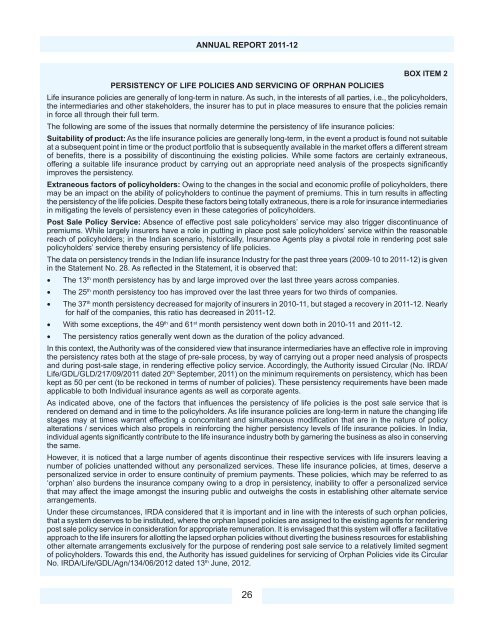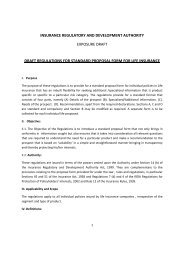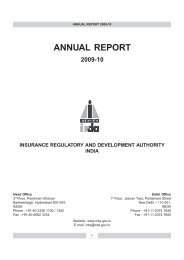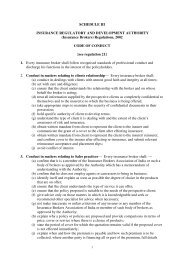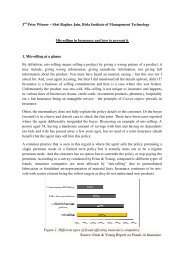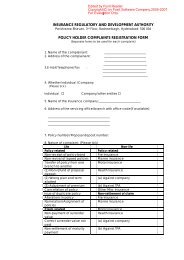Download PDF - IRDA
Download PDF - IRDA
Download PDF - IRDA
Create successful ePaper yourself
Turn your PDF publications into a flip-book with our unique Google optimized e-Paper software.
ANNUAL REPORT 2011-12<br />
BOX ITEM 2<br />
PERSISTENCY OF LIFE POLICIES AND SERVICING OF ORPHAN POLICIES<br />
Life insurance policies are generally of long-term in nature. As such, in the interests of all parties, i.e., the policyholders,<br />
the intermediaries and other stakeholders, the insurer has to put in place measures to ensure that the policies remain<br />
in force all through their full term.<br />
The following are some of the issues that normally determine the persistency of life insurance policies:<br />
Suitability of product: As the life insurance policies are generally long-term, in the event a product is found not suitable<br />
at a subsequent point in time or the product portfolio that is subsequently available in the market offers a different stream<br />
of benefi ts, there is a possibility of discontinuing the existing policies. While some factors are certainly extraneous,<br />
offering a suitable life insurance product by carrying out an appropriate need analysis of the prospects signifi cantly<br />
improves the persistency.<br />
Extraneous factors of policyholders: Owing to the changes in the social and economic profi le of policyholders, there<br />
may be an impact on the ability of policyholders to continue the payment of premiums. This in turn results in affecting<br />
the persistency of the life policies. Despite these factors being totally extraneous, there is a role for insurance intermediaries<br />
in mitigating the levels of persistency even in these categories of policyholders.<br />
Post Sale Policy Service: Absence of effective post sale policyholders’ service may also trigger discontinuance of<br />
premiums. While largely insurers have a role in putting in place post sale policyholders’ service within the reasonable<br />
reach of policyholders; in the Indian scenario, historically, Insurance Agents play a pivotal role in rendering post sale<br />
policyholders’ service thereby ensuring persistency of life policies.<br />
The data on persistency trends in the Indian life insurance Industry for the past three years (2009-10 to 2011-12) is given<br />
in the Statement No. 28. As refl ected in the Statement, it is observed that:<br />
The 13 th month persistency has by and large improved over the last three years across companies.<br />
The 25 th month persistency too has improved over the last three years for two thirds of companies.<br />
The 37 th month persistency decreased for majority of insurers in 2010-11, but staged a recovery in 2011-12. Nearly<br />
for half of the companies, this ratio has decreased in 2011-12.<br />
With some exceptions, the 49 th and 61 st month persistency went down both in 2010-11 and 2011-12.<br />
The persistency ratios generally went down as the duration of the policy advanced.<br />
In this context, the Authority was of the considered view that insurance intermediaries have an effective role in improving<br />
the persistency rates both at the stage of pre-sale process, by way of carrying out a proper need analysis of prospects<br />
and during post-sale stage, in rendering effective policy service. Accordingly, the Authority issued Circular (No. <strong>IRDA</strong>/<br />
Life/GDL/GLD/217/09/2011 dated 20 th September, 2011) on the minimum requirements on persistency, which has been<br />
kept as 50 per cent (to be reckoned in terms of number of policies). These persistency requirements have been made<br />
applicable to both Individual insurance agents as well as corporate agents.<br />
As indicated above, one of the factors that infl uences the persistency of life policies is the post sale service that is<br />
rendered on demand and in time to the policyholders. As life insurance policies are long-term in nature the changing life<br />
stages may at times warrant effecting a concomitant and simultaneous modifi cation that are in the nature of policy<br />
alterations / services which also propels in reinforcing the higher persistency levels of life insurance policies. In India,<br />
individual agents significantly contribute to the life insurance industry both by garnering the business as also in conserving<br />
the same.<br />
However, it is noticed that a large number of agents discontinue their respective services with life insurers leaving a<br />
number of policies unattended without any personalized services. These life insurance policies, at times, deserve a<br />
personalized service in order to ensure continuity of premium payments. These policies, which may be referred to as<br />
‘orphan’ also burdens the insurance company owing to a drop in persistency, inability to offer a personalized service<br />
that may affect the image amongst the insuring public and outweighs the costs in establishing other alternate service<br />
arrangements.<br />
Under these circumstances, <strong>IRDA</strong> considered that it is important and in line with the interests of such orphan policies,<br />
that a system deserves to be instituted, where the orphan lapsed policies are assigned to the existing agents for rendering<br />
post sale policy service in consideration for appropriate remuneration. It is envisaged that this system will offer a facilitative<br />
approach to the life insurers for allotting the lapsed orphan policies without diverting the business resources for establishing<br />
other alternate arrangements exclusively for the purpose of rendering post sale service to a relatively limited segment<br />
of policyholders. Towards this end, the Authority has issued guidelines for servicing of Orphan Policies vide its Circular<br />
No. <strong>IRDA</strong>/Life/GDL/Agn/134/06/2012 dated 13 th June, 2012.<br />
26


